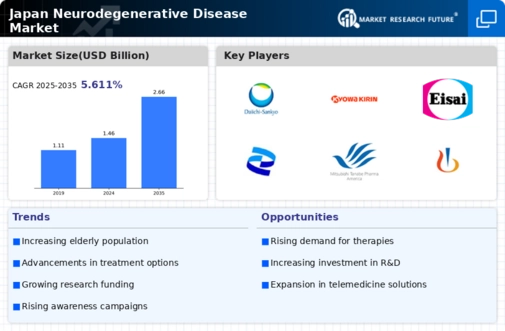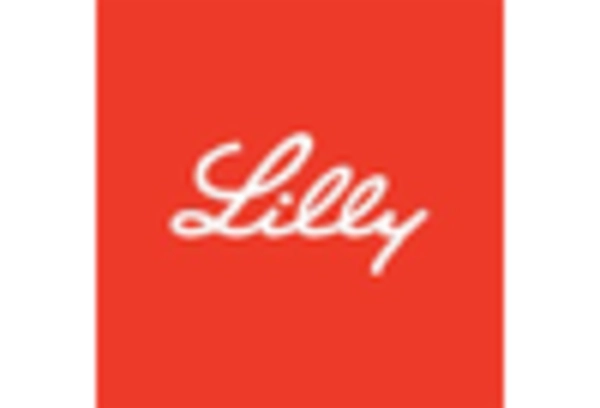Aging Population in Japan
The aging population in Japan is a critical driver for the neurodegenerative disease market. As the demographic shifts towards an older age group, the incidence of neurodegenerative diseases such as Alzheimer's and Parkinson's is expected to rise. Currently, approximately 28% of the Japanese population is aged 65 and older, a figure projected to increase to 38% by 2050. This demographic trend suggests a growing need for effective treatments and care solutions within the neurodegenerative disease market. Furthermore, the increasing life expectancy, which stands at around 84 years, further exacerbates the prevalence of these diseases, thereby driving demand for innovative therapies and healthcare services tailored to this aging cohort.
Rising Awareness and Education
Rising awareness and education regarding neurodegenerative diseases play a pivotal role in shaping the market landscape. In Japan, initiatives aimed at educating the public and healthcare professionals about the symptoms and early detection of these diseases are gaining traction. This increased awareness is likely to lead to earlier diagnoses, which can significantly impact treatment efficacy. Moreover, as more individuals become informed about available therapies and support systems, the demand for services within the neurodegenerative disease market is expected to grow. Educational campaigns and community outreach programs are essential in fostering a better understanding of these conditions, ultimately driving market expansion.
Advancements in Diagnostic Technologies
Advancements in diagnostic technologies are transforming the neurodegenerative disease market. In Japan, the integration of advanced imaging techniques and biomarker identification is enhancing the accuracy of diagnoses. Technologies such as PET scans and MRI are becoming more prevalent, allowing for earlier detection of neurodegenerative diseases. This shift towards precision medicine is crucial, as it enables healthcare providers to tailor treatment plans based on individual patient profiles. The market is likely to see an increase in demand for these diagnostic tools, as they facilitate timely interventions and improve patient management strategies, thereby contributing to overall market growth.
Growing Demand for Home Healthcare Services
The growing demand for home healthcare services is emerging as a significant driver in the neurodegenerative disease market. With the increasing prevalence of neurodegenerative diseases among the aging population, many families are seeking alternatives to institutional care. Home healthcare services offer personalized care and support, allowing patients to maintain their independence while receiving necessary medical attention. In Japan, the home healthcare market is projected to grow at a CAGR of approximately 10% over the next five years. This trend indicates a shift towards more patient-centered care models, which are likely to influence the neurodegenerative disease market positively, as providers adapt to meet the needs of patients and their families.
Increased Research and Development Investment
Investment in research and development (R&D) is a significant driver of the neurodegenerative disease market. In Japan, government and private sector funding for R&D in neuroscience has seen a notable increase, with expenditures reaching approximately ¥1 trillion in recent years. This financial commitment aims to foster innovation in drug development and therapeutic approaches for neurodegenerative diseases. The focus on R&D is crucial, as it not only enhances the understanding of disease mechanisms but also accelerates the discovery of novel treatments. As a result, the neurodegenerative disease market is likely to benefit from breakthroughs in therapies that could improve patient outcomes and quality of life.
















